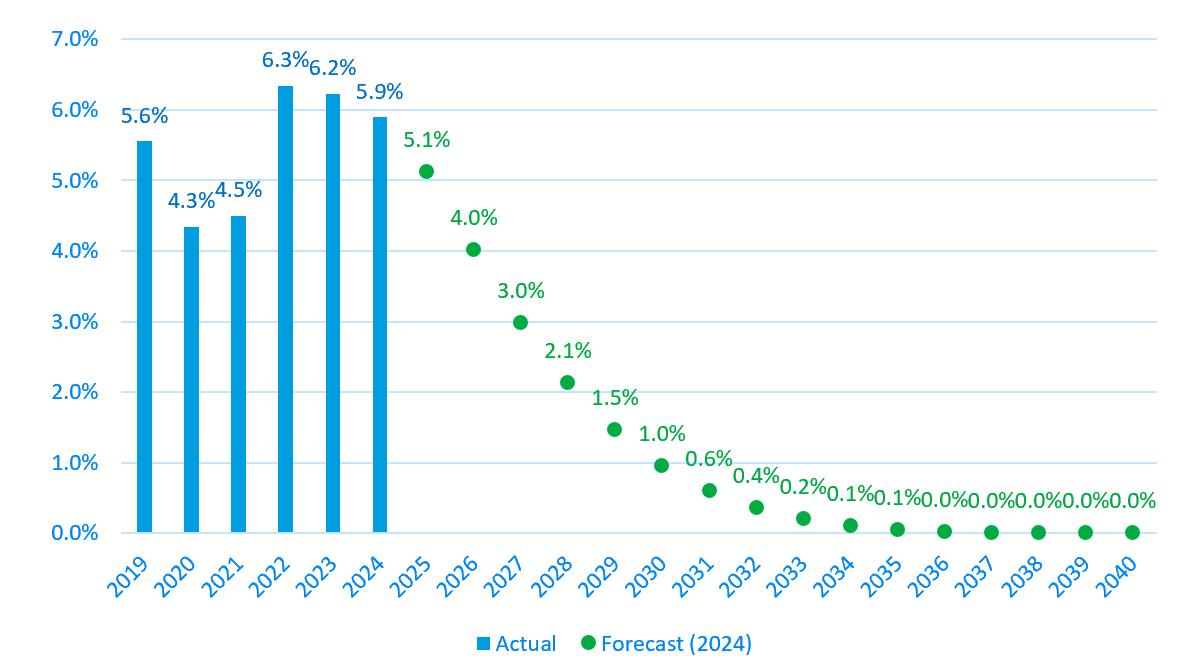Investment Office

CONSOLIDATED ENDOWMENT FUND
Environmental, Social, and Governance Report, 2023-24
May 2025

EXECUTIVE SUMMARY
The University of Pittsburgh released its inaugural environmental, social, and governance (ESG) Report in March 2022.1 This report, for the fiscal year ended June 30, 2024, is the fourth edition of what the University expects to continue to release annually.
The University of Pittsburgh’s largest financial asset is its Consolidated Endowment Fund (CEF), valued at $5.7 billion as of June 30, 2024. The CEF supports financial aid, scholarships, faculty positions, and research activities and links past, current, and future generations of University stakeholders, including students, faculty, and staff.
The primary investment objective of the CEF is to earn a rate of return over an extended period of time that is sufficient to support a prudent spending policy while preserving its inflation-adjusted asset value. It is the
University’s core belief that supporting responsible business practices is integral to producing strong investment outcomes.
This is not a new concept at Pitt. In fact, the Investment Office (formerly the “Office of Finance”), which manages the CEF, has been incorporating many of the concepts now referred to as “ESG factors” into its due diligence process on a case-by-case basis since 1990. In an effort to formalize that approach, an ESG Policy for the CEF was established in March 2020. 2

1 Available at https://www.cfo.pitt.edu/sites/default/files/esg_report_final.pdf
2 Available at https://www.financeoperations.pitt.edu/sites/default/files/esgpolicyfinal3-25-20.pdf

This report provides updates on the following topics:
CEF Fossil Fuel Exposure:
Total (public and private) exposure to fossil fuels decreased from 8.2% of the CEF as of June 30, 2023, to 7.8% as of June 30, 2024. Private investment exposure to fossil fuels, which decreased from 6.2% of the CEF as of June 30, 2023, to 5.9% as of June 30, 2024, is currently projected to become de minimis around 203536, given current trend lines. This forecast is likely to fluctuate significantly over time for reasons outlined in this report.
Policies Regarding Direct Engagement with Underlying Companies and Proxy Voting:
The report provides an overview of the policies governing the University’s direct engagement with underlying investment holdings regarding ESG matters and its approach to proxy voting.
External Investment Manager ESG Policies:
External investment managers currently overseeing approximately 94% of the CEF by value have formal ESG policies in place or have indicated that they take ESG considerations into account when making investments. Only ESG considerations that have financial implications (enhancing returns or mitigating risk) are taken into account – investments are not made to promote political or social causes.
CEF Sustainable Investing Road Map and Future Commitments:
Four commitments were made in the inaugural ESG Report and are outlined on page 11. The Investment Office has made progress on these commitments since that report was issued, including the maintenance of an ESG section on the Pitt Finance & Operations website and participation in formal and informal discussions
with peers regarding ESG-related financial considerations. 3
Recognizing that certain ESG-related factors can have direct financial implications, the University has implemented a more consistent approach to ESG than in the past. As standardized metrics by which to gauge ESG-related financial considerations are developed based on rigorous data, the Investment Office will consider including them in future reports.
It is important to note that this report focuses only on ESG considerations as they relate to CEF investments. The University of Pittsburgh has been actively involved much more broadly in sustainability initiatives for more than 30 years, especially in connection with its operations (for further information, please visit https:// sustainable.pitt.edu).
3 Available at https://www.financeoperations.pitt.edu/units/investment-office/environmental-social-and-governance-esg-investment-considerations-pitt

INTRODUCTION
Founded in 1787, the University of Pittsburgh has a mission to provide high-quality undergraduate and graduate programs in the arts and sciences and professional fields while supporting broader public interests contributing to the social, intellectual, and economic development of the Commonwealth of Pennsylvania, the nation, and the world. This mission is future oriented, perpetual in nature, and intrinsically supportive of positive societal and environmental developments beyond the University’s campuses.
Pitt’s Consolidated Endowment Fund (CEF) is the University’s largest financial asset, valued at $5.7 billion as of June 30, 2024. The purpose of the CEF is to provide permanent and stable financial support for the benefit of current and future generations of University stakeholders in perpetuity by funding financial aid, scholarships, faculty positions, research activities, and more.
The CEF is governed by the Investment Committee of the Board of Trustees and is prudently managed by University staff in the Investment Office within the Office of the Executive Senior Vice Chancellor for Administration and Finance and Chief Financial Officer. Over the course of the University’s 238-year history, community interest in CEF investment exposures has grown in significance, prompting reflection and action by the board and Investment Office staff. In recent years, investment considerations related to multiple issues have grown in focus among the University’s stakeholders, including the broader University community (undergraduate and graduate students, faculty, staff, and alumni), the neighborhood of Oakland, the City of Pittsburgh, and the greater Pittsburgh region.

4
The increased significance of these topics among community stakeholders has coincided and overlapped with a growing investment sector awareness of the potential benefits of considering ESG factors in investment decision-making. As explained in Pitt’s ESG Policy, ESG factors include considerations that can improve the quality of investment decision-making by presenting a deeper and more robust assessment of expected risks and returns. Environmental factors may relate to how a company manages waste or greenhouse gas emissions; social factors may relate to discrimination, data protection or compensation, and retention strategies and policies; and governance factors may relate to how a company’s senior management is compensated, its succession planning, the compensation of its board of directors, and/ or how shareholder rights are addressed. The Investment Office has incorporated ESG factors into its investment due diligence process for many years; however, more recently, the Investment Office staff has done so with a more structured process and an increased focus, diligence, and purpose, as has the institutional investment sector. This increased focus on ESG factors culminated with the release of the inaugural ESG Report in March 2022.4
THE FUNCTION AND PURPOSE OF PITT’S ENDOWMENT
It is important to review the broader context of the CEF, including why it exists, who governs and manages it, and how it is structured.
What is an endowment?
An endowment is a gift of funds or property whose purpose is to provide the recipient with a source of revenue. Pitt’s endowment is designed to keep the original gift principal intact while using some or all of the resulting investment returns as revenue that financially supports the University’s operating budget, primarily in the form of financial aid for students. The two primary goals of general endowment management are:
1. to preserve the long-term real purchasing power of assets by generating net investment returns that match or exceed the endowment’s annual spending and the eroding effects of inflation and
2. to provide a reliable stream of meaningful revenue for the University.
There is an essential need for universities to invest an endowment’s principal effectively in order to generate sufficient income to provide financial aid, support endowed chairs and professorships, and fund operations, among other uses.
What are Pitt’s endowment characteristics?
The CEF is an investment pool comprising more than 3,000 individual endowment funds, all with designated purposes and restrictions, that are commingled (pooled together) to facilitate more efficient investment. Each endowment fund that the University accepts has a clearly stated, legally binding purpose for the assets provided to which the University must adhere. Additionally, the legal documents accompanying CEF investments typically include confidentiality provisions that prevent the University from disclosing specific investments or investment managers. Confidentiality provisions are deemed necessary to avoid impairing long-term investment returns.
Financial Aid
Chairs, Professorships, and Instruction
Postretirement Reserves
Scholarships, Fellowships, and Awards
Other Purposes
Among CEF objectives, the most critical to the University’s mission is the long-term preservation of assets on a real (inflation-adjusted) basis, as they provide a steady, meaningful stream of income to University beneficiaries. Figure 1 indicates the defined purposes for Pitt’s CEF funds.5 These endowed gifts provide perpetual financial support for scholarships, fellowships, faculty chairs, instruction, and other University programs and services.6
5 “Other Purposes” include research, library and public service, general and undesignated funds, long-term reserve fund, and development and institutional support.
6 The University provides postretirement medical and life insurance benefits to eligible employees and their spouses upon retirement through a contributory benefit plan. The University has elected to fund its postretirement liability via a designated endowment fund that is managed within the CEF and referred to as postretirement reserves.





